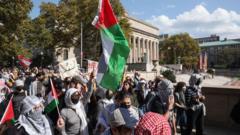Mohsen Mahdawi, a student activist and organizer of pro-Palestinian protests at Columbia University, was apprehended by immigration officials in a controversial incident during his US citizenship interview. His lawyer claims that the arrest was a direct response to Mahdawi's advocacy against the Israel-Gaza conflict, raising alarms about the implications for free speech and activism in educational institutions.
Mahdawi, who holds a green card and is set to graduate next month, was detained on Monday in Colchester, Vermont. His lawyer, Luna Droubi, alleged that the detention was retaliation for Mahdawi's role in protests and indicated a worrying trend where the government targets individuals based on their political beliefs and identity.
Reports indicate that Mahdawi was escorted by two officers in tactical jackets, a scene that has surfaced on social media platforms. Droubi has filed for a temporary restraining order to prevent his expulsion from the U.S., which a federal judge quickly approved. Born in a refugee camp in the West Bank, Mahdawi moved to the U.S. in 2014 and has been a permanent resident since 2015. Describing himself as a Buddhist who advocates for non-violence and empathy, he has been vocal in condemning Israel’s military actions during the ongoing conflict.
In recent statements, political figures like Vermont Senator Bernie Sanders have condemned Mahdawi's detention, asserting that it contradicts due process rights guaranteed under U.S. law. Others, including fellow student Mahmoud Khalil from Columbia University, are facing similar challenges, with immigration officials escalating their actions against individuals involved in protests related to the Israel-Palestine situation.
The backdrop of this event reflects ongoing tensions under the Trump administration's immigration policies, which have seen an increased crackdown on foreign students allegedly linked to anti-Semitism. Critics argue that the government's measures may not only infringe upon the rights of free speech but could also instigate broader constitutional conflicts if students like Mahdawi are denied legal protections. As the situation develops, many are keenly watching how it may impact future activism on college campuses across the nation.






















